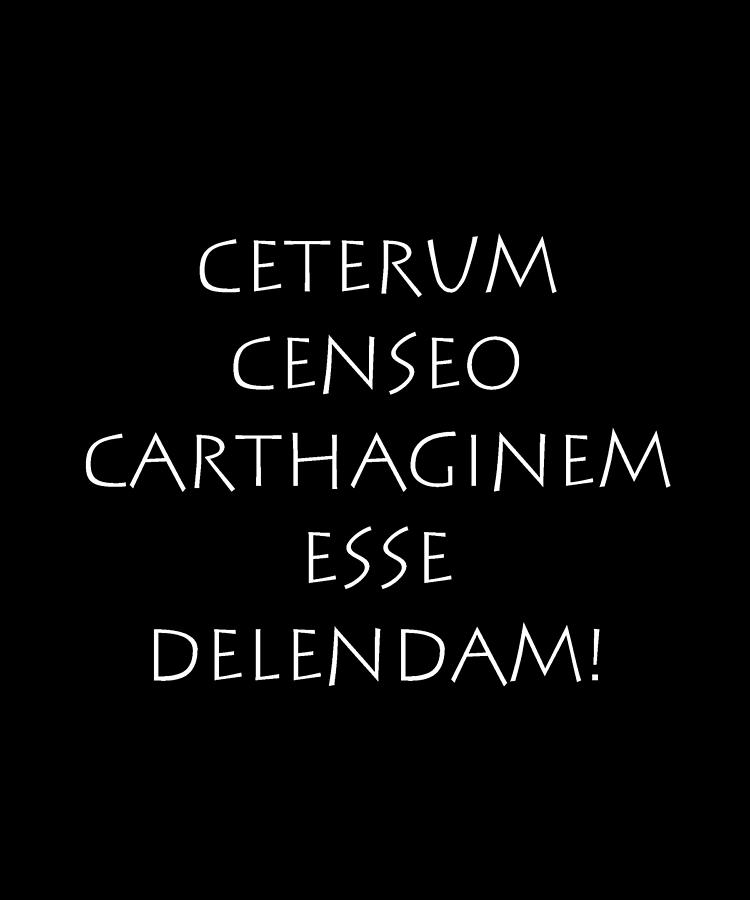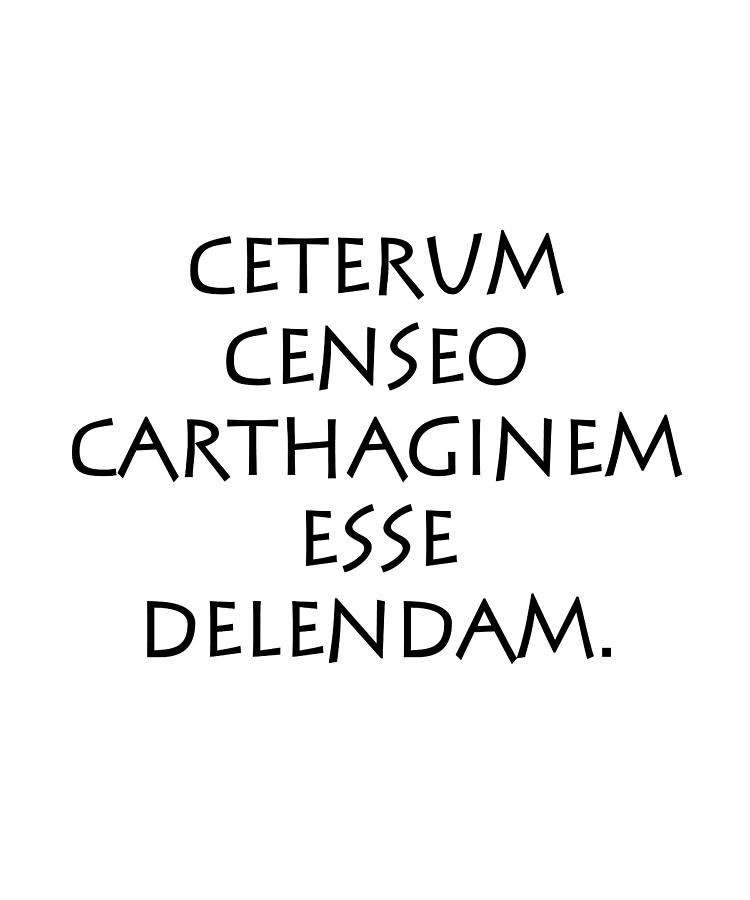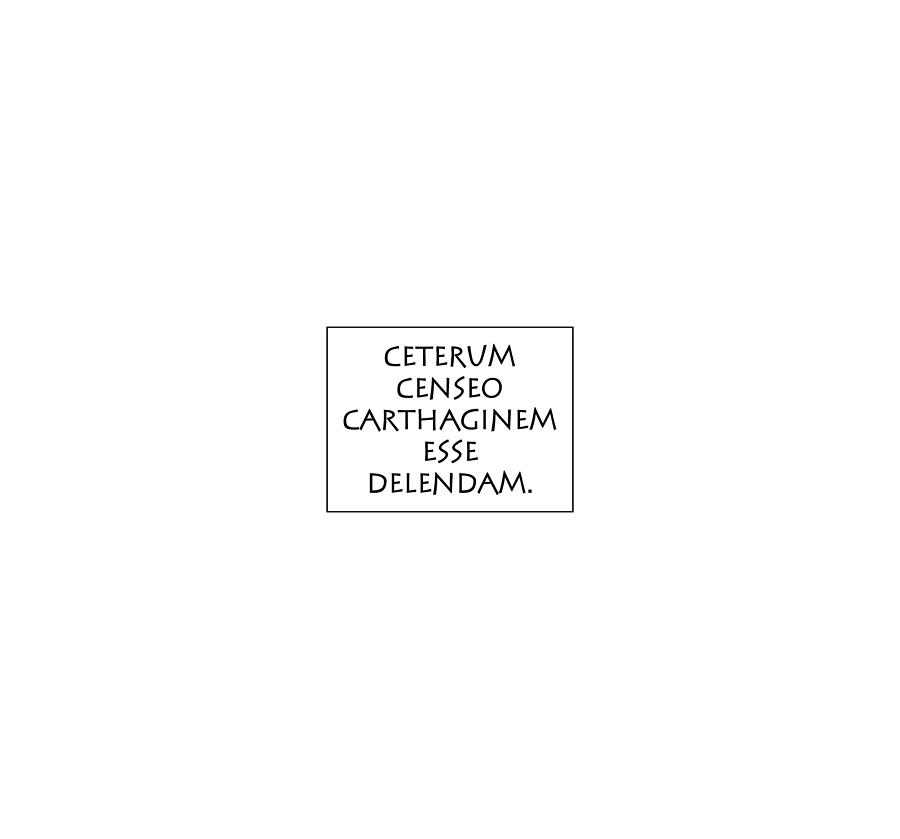
Ceterum censeo Carthaginem esse delendam. Cato. TShirt Amazon.co.uk Fashion
The full phrase is, as r/deadtective mentioned: Ceterum censeo Carthaginem esse delendam and there are two major grammatical constructions to be used here. For your shorter phrase, only my first point is relevant. The first one is the Latin gerundive which has the meaning of 'to be verbed' and is created by taking the stem, adding -and-/-end- and the adjective endings.

Ceterum censeo Carthaginem esse delendam! Povijest.hr
We need not suppose that the Senate decided to destroy Carthage rather than listen any longer to Cato ending all his sententiae in the Curia with the words 'ceterum censeo Carthaginem esse delendam'. The motives that led Cato, who after Pydna had spoken up for the Rhodians and apparently had quoted with approval a plea of Scipio Africanus.

Ceterum censeo Carthaginem esse delendam Digital Art by Vidddie Publyshd Fine Art America
Book title. Statistics, science and public policy XVI : risks, rights and regulations : proceedings of the Conference on Statistics, Science and Public Policy held at Herstmonceux Castle, Hailsham, U.K., April 17-20, 2011.

Ceterum censeo Carthaginem esse delendam! by Vyacheslav Rusyaev · Putty&Paint Punic wars
Other times, his phrase is fully quoted as "Moreover, I advise that Carthage must be destroyed" (Ceterum censeo Carthaginem esse delendam). Cicero's dialogue Cato the Elder on Old Age also depicted Cato's antipathy to Carthage. According to Ben Kiernan, Cato may have made the first recorded incitement to genocide.

"Ceterum censeo patriarchiam esse delendam" Photographic Print for Sale by Eithin Redbubble
ceterum censeo "unit libertatem" esse delendam. Reply reply oh_horsefeathers • Boy, my German must be worse than I thought..

Albanian traditional clothes long Jelek Ceterum Censeo Carthaginem Esse Delendam
Cato the Elder (234-149 BC), the most persistent advocate in the Senate for the total destruction of Carthage, and most famously associated with repeated use, in or out of its proper context, of the phrase Delenda est Carthago. Ruins in Carthage. The location of Carthage in North Africa. " Ceterum censeo Carthaginem esse delendam ", or.

Ceterum Censeo Carthaginem Esse Delendam Tile Patterns, Textures Patterns, Print Patterns
From Cato the Elder 's practice of ending every speech, no matter the topic, with ceterum censeo Carthaginem esse delendam ("furthermore, I propose that Carthage is to be destroyed"). Phrase [ edit] cēterum censeō " furthermore, I propose ": a formulaic expression used to end a speech by reinforcing one, often unrelated, major view Categories

Ceterum censeo Carthaginem esse delendam (Cato the Elder) Latin Simple YouTube
Ceterum (autem) censeo Carthaginem esse delendam ("Furthermore, I consider that Carthage must be destroyed"), often abbreviated to Carthago delenda est or delenda est Carthago ("Carthage must be destroyed"), is a Latin oratorical phrase pronounced by Cato the Elder, a politician of the Roman Republic.

Ceterum censeo Carthaginem esse delendam Digital Art by Vidddie Publyshd Fine Art America
The Roman senator Cato the Elder ended every speech after the Second Punic War with ceterum censeo Carthaginem esse delendam, literally "For the rest, I am of the opinion that Carthage is to be destroyed." Before the ratification of the Treaty of Lisbon in the European Parliament, Daniel Hannan ended all his speeches in a similar way with.

Ceterum censeo Carthaginem esse delendam civ
Ceterum censeo Carthaginem esse delendam. Sometimes quoted as Carthago delenda est. Moreover, I consider that Carthage should be destroyed. Cato was convinced that the security of Rome depended on the annihilation of Carthage and he urged his countrymen to the Third Punic War. Towards the end of his life he ended all of his speeches in the.

Carthage Ceterum censeo Carthaginem esse delendam! by Westwards
Ceterum (autem) censeo Carthaginem esse delendam ("Furthermore, I consider that Carthage must be destroyed"), often abbreviated to Carthago delenda est or delenda est Carthago ("Carthage must be destroyed"), is a Latin oratorical phrase pronounced by Cato the Elder, a politician of the Roman Republic.

Ceterum censeo Carthaginem esse delendam Digital Art by Vidddie Publyshd Pixels
Ceterum censeo Carthaginem esse delendam. Ceterum censeo Carthaginem esse delendam (seltener ceterum autem censeo Carthaginem esse delendam; lateinisch für: „Im Übrigen bin ich der Meinung, dass Karthago zerstört werden muss") ist ein dem römischen Staatsmann Cato dem Älteren (234-149 v. Chr.) zugeschriebener Ausspruch.

Ceterum censeo Carthaginem esse delendam Digital Art by Vidddie Publyshd Fine Art America
the Curia with the words 'ceterum censeo Carthaginem esse delendam'. The motives that led Cato, who after Pydna had spoken up for the Rhodians' and apparently had quoted with approval a plea of Scipio Africanus against the destruction of Carthage after Zama,2 to urge the destruction of Carthage are part of the investigation.

Ceterum censeo Carthaginem esse delendam Let's play Rome 2 Folge 45 YouTube
" Ceterum censeo Carthaginem esse delendam " or " Ceterum autem censeo Carthaginem esse delendam " (English: "Furthermore, (moreover) I consider that Carthage must be destroyed") often abbreviated to " Ceterum censeo ", " Carthago delenda est ", or " Delenda est Carthago " [1] (English: "Carthage must be destroyed") is a Latin oratorical phrase.

Ceterum censeo Carthaginem esse delendam! Painting, Roman soldiers, Miniatures
The phrase comes from Cato the Elder, who used this phrase in every speech to the Senate. Even when the speech had nothing to do with Carthage, he always concluded his speech with the phrase "ceterum censeo Carthaginem esse delendam" which means "Apart from that, I conclude that Carthage must be destroyed." After continued usage of this.

Albanian Jelek/Xhamadan Ceterum Censeo Carthaginem Esse Delendam
Ceterum censeo Carthaginem esse delendam - Apart from that, I conclude that Carthage must be destroyed. Cato the Elder | about the origin, history, Cato the.